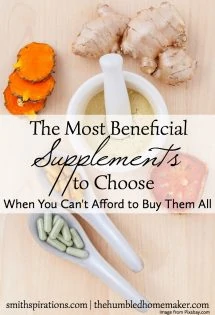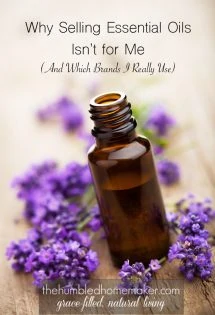Choosing the most beneficial supplements for your family and your budget can be a real challenge. How can you decide which to take when you can’t afford them all?

By Kristen Smith, Contributing Writer
I doubt I’m the only one.
You walk into a health food store or visit an online health and wellness shop, start browsing, and begin to wonder if you’re missing out on the prime of health because there’s no way under the great blue heavens you could ever afford to take so many supplements.
Hmm… is that superfood green powder stuff something I should invest in for our smoothies?
I wonder if wheat grass would help me with my energy in the mornings.
My sister-in-law swears by beet juice powder. Maybe that would help me, too?
I love healthy living that focuses on prevention through nutrition. Using supplements is certainly a part of that. But you know what? I’m also working with my husband to raise a large family with a limited budget, and the bottom line is that most supplements are expensive.
What’s a family to do when you can’t afford them all?
The Real Purpose of Dietary Supplements
When it comes to choosing dietary supplements, one of the best things we can do is to remember what they can and can’t do.
No supplement can take the place of a healthy diet that limits processed foods and focuses on real, whole foods instead. All of the liquids, powders, pills, and capsules promising revived health can be helpful to fill in the gaps, but none of them should ever be our main focus.
When frugality and limited spending need to be a priority, focusing first on nutritious foods will do so much more for your health than any supplement can.
Then, with whatever extra is available for supplements, you can consider some of these based on your needs and those of your family.
Best Supplements for General Health
A Quality Probiotic
Maintaining good gut microbes is one of the best things we can do for ourselves. Poor gut flora is linked to all sort of health concerns, including mental health, immunity, skin conditions, and more! I like to choose probiotics that are kept refrigerated, contain a wide variety of strains, and are free from other additives.
Omega 3 Essential Fatty Acids (Fish Oil)
Processed, modern foods tend to be very high in omega 6 fatty acids and low in omega 3s, and that imbalance can lead to inflammation in the body. Inflammation in turn can lead to a host of chronic health conditions. Supplementing with a concentrated source of omega 3 fatty acids, like a quality fish oil, can help keep the right balance of essential fatty acids and prevent inflammation.
A Food-Based Multivitamin
Ideally, we’d all get every bit of needed nutrition from our diets, but that’s typically not the case for the vast majority of us, no matter how hard we try to eat well. Adding in a food-based multivitamin is a great way to just fill in the gaps of where our diet might be lacking.
Herbal Adaptogens and Liver Support
Stress and motherhood go hand in hand. Goodness, stress and adulting go hand in hand! Adaptogens are a class of herbs that help the body deal with stress. These herbs, like astragalus, holy basil (tulsi), and goji berries, can all be taken daily to combat stress and boost general immunity.
Many adults also benefit from a quality liver supportive herb or blend. Our livers are our detoxifying organs, and with a multitude of toxins in our environment, encouraging prime liver function is wise! Dandelion and milk thistle are two fantastic herbs that are very effective and can be taken long-term.
Choosing Supplements for Pregnancy and Childhood
Pregnancy brings with it additional health concerns that can be helped with some key supplements. Along with a quality food-based prenatal vitamin and the other supplements listed above, drinking an herbal pregnancy tea offers many benefits. A healthcare provider might also suggest an iron or calcium/magnesium supplement, too.
Of course, it’s always wise to verify that any supplements you choose are safe and appropriate for pregnancy and breastfeeding later on! You can consult with your healthcare provider or a trained herbalist for information.
Growing children also can benefit from multivitamins, probiotics, and omega 3s. In the fall and winter, I like to include an immune-boosting Elderberry Plus Syrup as a cold and flu preventative, too. Sometimes I even make a liquid multi-vitamin herbal extract to use in place of a multi-vitamin!






Keelie Reason
I’ve never taken vitamins. Maybe I should consider doing that. 🙂 Thanks for the roundup.
Erin
Do it, girl!! 😉
K. Ann Guinn
I’ve definitely felt this struggle. Not only is the expense an issue, but I agree that we should be getting the majority of our nutrition from real foods. I don’t want to take so many supplements, but it is confusing at times and most of them sound so beneficial!
Thanks for an educational and encouraging reminder on what is most important.
K. Ann Guinn
Oops. Sorry; I’m still new at this. 🙂
Kristen Smith
Glad it was helpful, K. Ann!
Christine @ The (mostly) Simple Life
Thanks for this! It is very overwhelming at the health store to know what’s really necessary. You’ve inspired me to look into probiotics. I have a multivitamin and fish oil, but I’m bad at taking them regularly.
Kristen Smith
I’ve been really inconsistent taking the cod liver oil in our refrigerator, too. Writing this made me want to become more consistent again!
Kimberly
I was hoping you would suggest a good brand of multivitamin to take. I know one doesn’t have everything but I am sure some are better than others.
Kristen Smith
Hi Kimberly! For a multivitamin, much of it will depend on your stage of life and perhaps any other unique needs or health issues you want to address. One thing I like to look for is a whole foods or food-based multivitamin. There are various brands on the market, but a couple to mention are Rainbow Light and New Chapter Organics. I’ve even seen some online retailers like Vitacost rolling out their own private label food-based vitamins. Hope that helps a little!
Lisa @ This Pilgrim Life
This is really helpful, because I definitely feel overwhelmed when it comes to supplements.
I’m pregnant now, and have a condition called cholestasis in which my liver isn’t functioning as it should. Have you heard of it? Are you familiar with any supplements that help liver support in pregnancy? I’m taking a prescription to help, but my husband has asked about any natural helps too, and I just haven’t seen anything or don’t know the best place to look. If you don’t know either, no worries. Just thought I’d ask.
I’m pinning this for future reference. Thanks for all the recommendations. 🙂
Kristen Smith
Hi Lisa! There are some excellent herbs that support liver function. Milk thistle and dandelion are two great examples. I’m not sure how they will interact with your medication, so definitely check with your doctor about taking them. One study abstract I looked up cited milk thistle as a safe treatment for cholestasis, so it’s certainly worth looking into further! Milk thistle and dandelion are both also safe to take while pregnant and breastfeeding.
Andrea
I am skeptical of nutritional supplements. They are not FDA approved. The supplement manufacturers can make bold statements as to what their supplements can achieve for our health without any kind of testing or long term studies to confirm their claims. Making a profit is the supplement manufactures top priority and they will market their products as “organic” or “all natural” in order to appeal to the consumer who is interested in living a healthy life style. Before taking any supplement, I urge you to discuss what you want to take with your doctor and to tell your doctor of any supplements you are taking. Certain “all natural” supplements can have dangerous effects if mixed with other prescription medicines. I think our best bet for good health is getting all of our nutrition needs from our food. Take care.
Kristen Smith
Hi Andrea. I 100% agree that you should tell your care provider about any supplements you take, especially when on other prescription medications as they can interact. I also agree that it would be ideal to get all of our nutrition from food, and food should always be the focus (as I mentioned in the article).
However, I don’t think it’s fair or accurate to lump all supplement lines and brands into one category of only being interested in profit. Similarly, supplement companies can get into serious trouble with the FDA for making false, misleading, or bold statements of curing or treating any disease or condition. In fact, supplement companies can really only discuss supporting wellness of bodily systems and functions in rather general terms. When they go past that, for better or for worse, there can be serious fines. Of course not every company complies, but they put themselves at great risk when they don’t!
There are also vast amounts of clinical studies and other research documenting the benefits of various supplements, especially the ones I mentioned here. The burden is certainly on the consumer to do their due diligence and seek out safe and effective supplements, as well as quality brands, but there absolutely is ample research available to do that. Pubmed is a great place to start.
Thanks for sharing your thoughts, though! And I would also say that if you are skeptical of supplements and feel like you’re getting what you need through diet alone, then continue doing just that. 🙂
Shezad Adil
I am using Vitamin D supplements for weak bones. First, I was afraid of using supplements as I heard much about the grisly side effects. But believe me, I am really feeling good by using it. But one thing is really important, never ever exceed the predicted amount of any supplement to avoid dangerous affects.
Kristen Smith
So, so true! It’s very easy to fall into the mindset that if a little is good, more might is better. But this is definitely not the case with supplements! They are to fill in the gaps.
Mindie
I agree with you that we should be getting as much nutrition as we can from our food, and taking this or that supplement that is geared towards specific areas may be helpful if it is truly a quality product. Still, I find a lot of these options and information confusing and stressful.